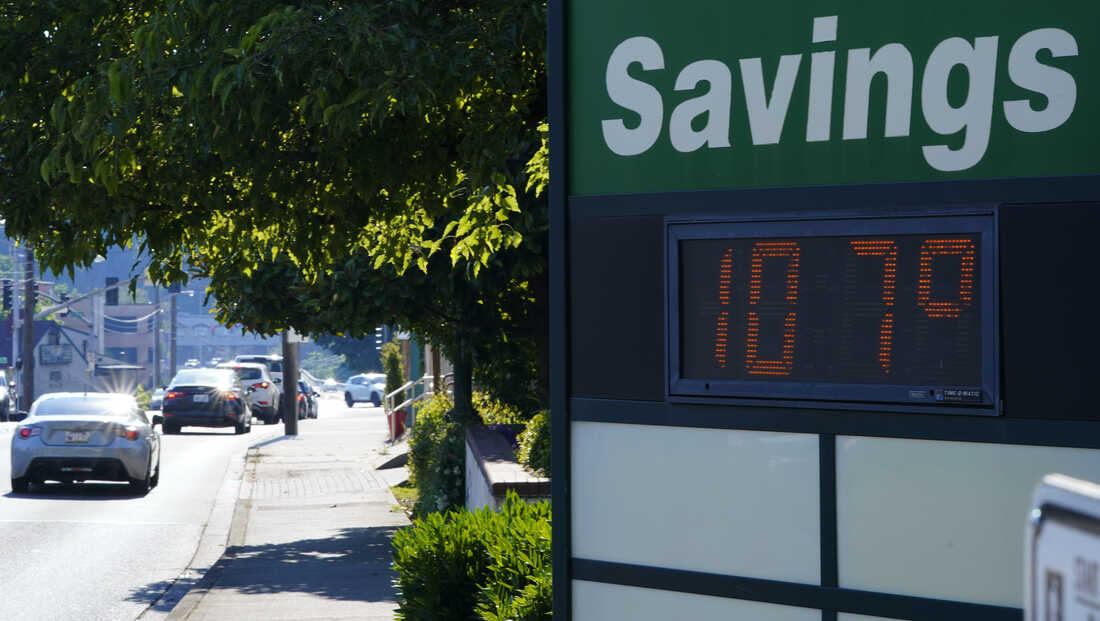When Will It Get Hot Again in Oregon

Farmworkers till soil as a oestrus wave bakes the Pacific Northwest in about St. Paul, Ore., in early July. Nathan Howard/AP hibernate caption
toggle caption
Nathan Howard/AP

Farmworkers till soil equally a heat moving ridge bakes the Pacific Northwest in near St. Paul, Ore., in early July.
Nathan Howard/AP
PORTLAND, Ore. — People in the Pacific Northwest braced for another major, multiday heat wave starting Wednesday, just over a month after record-shattering hot weather killed hundreds of the region's near vulnerable people when temperatures soared to 116 degrees Fahrenheit (47 Celsius).
In a "worst-case scenario," the temperature could reach every bit high as 111 F (44 C) in some parts of western Oregon past Friday before a weekend cooldown, the National Weather Service in Portland, Oregon, warned this week. It's more likely temperatures volition rise in a higher place 100 F (38 C) for three consecutive days, peaking around 105 F (40.v C) on Th.
Those are heart-popping numbers in a unremarkably temperate region and would break some all-time records if the late June rut wave hadn't done so already, meteorologist Tyler Kranz said. Seattle volition exist cooler than Portland, with temperatures in the mid-90s, but information technology still has a chance to break records, and many people there, similar in Oregon, don't have air conditioning.
"We'll ofttimes hear people say, 'Who cares if it's 106 or 108? Information technology gets this hot in Arizona all the fourth dimension.' Well, people in Arizona take air conditioning, and here in the Pacific Northwest, a lot of people don't," Kranz said. "You can't really compare us to the desert Southwest."
Gov. Kate Dark-brown has declared a country of emergency over the rut and activated an emergency operations center, citing the potential for disruptions to the ability grid and transportation. Metropolis and county governments are opening cooling centers and misting stations in public buildings, extending public library hours and waiving bus fare for those headed to cooling centers. A statewide assist line will straight callers to the nearest cooling shelter and offering tips on how to stay safe.

A display at an Olympia Federal Savings branch shows a temperature of 107 degrees Fahrenheit, on June 28 in Olympia, Wash. The Pacific Northwest is bracing for some other major, multi-mean solar day heat moving ridge. Ted S. Warren/AP hide caption
toggle caption
Ted S. Warren/AP

A display at an Olympia Federal Savings branch shows a temperature of 107 degrees Fahrenheit, on June 28 in Olympia, Wash. The Pacific Northwest is bracing for another major, multi-twenty-four hour period estrus moving ridge.
Ted South. Warren/AP
Climate change is making the heat more extreme in the region
The back-to-back heat waves, coupled with a summer that's been exceptionally warm and dry out overall, are pummeling a region where summertime highs usually drift into the 70s or 80s. Both the rut and a historic drought across the American Westward reflect climate alter that makes conditions more extreme in the historically temperate region.
The June estrus in Oregon, Washington and British Columbia killed hundreds of people and was a wake-up telephone call. It was almost incommunicable without homo-caused climate change, a scientific analysis found.
In Oregon, officials say at least 83 people died of heat-related disease, and the hot weather is being investigated as a possible crusade in 33 more than deaths. Washington state reported at least 91 rut deaths, and officials in British Columbia say hundreds of "sudden and unexpected deaths" were likely due to the soaring temperatures.
The toll exposed huge bullheaded spots in emergency planning in a region unaccustomed to dealing with such high temperatures, said Vivek Shandas, a professor of climate adaptation at Portland Country University.
Most of those who died in Oregon were older, homebound and socially isolated, and many were unable, or unwilling, to go to cooling centers.
The call heart designed to provide information about cooling centers was unstaffed during part of the meridian estrus, and hundreds of callers got stuck in a voicemail bill of fare that didn't include a prompt for heat-related aid. Portland's famed light-rail railroad train likewise shut down to reduce strain on the power filigree, eliminating a transportation option for depression-income residents seeking relief.
"We knew a week in advance. What would happen if we knew an convulsion was going to striking u.s.a. a calendar week in accelerate?" Shandas said. "That's the kind of thinking we demand to be aligned with. We know something disastrous is coming, and we need to get all hands on deck and focus on the almost vulnerable."
People of all ages are trying to plan for how to deal with the hot weather
Yet fifty-fifty younger residents struggled with the heat in June and dreaded this week's sweltering temperatures.
Katherine Morgan, 27, has no air conditioning in her third-floor apartment and tin't afford a window unit on the money she makes working at a bookstore and as a hostess at a brewery.
She estimated that it hit 112 F (44 C) in her flat in June. She tried to keep absurd past taking cold showers, dousing her pilus with water, eating Popsicles and sitting immobile in front of a fan for hours.
Morgan, who doesn't accept a motorcar, got ill from the heat after walking xx minutes to work when it was 106 F (41 C). She took the following two days off rather than risk information technology again. The heat from the sidewalk, she said, felt similar information technology was "cooking my ankles."
This week, she'll have to walk to work Thursday, the solar day when temperatures could again soar simply as high.
"All my friends and I knew that climate change was existent, but information technology's getting actually scary considering it was gradually getting hot — and information technology suddenly got really hot, actually fast," Morgan said. "Information technology's eye-opening."
mitchellpultooper1981.blogspot.com
Source: https://www.npr.org/2021/08/11/1026672403/oregon-washington-climate-change-heat-wave
0 Response to "When Will It Get Hot Again in Oregon"
Postar um comentário